I learned something new and I came back to share with the class. I decided to put it in this topic and not the “other” topic that I normally spam because I think it directly pertains to file size. If you are a fan of lossy music, then I think this post is going to be transformative.
I’ll lead with the controversial statement first: MP3 is a legacy format and you should not rip new items to MP3 if you can help it.
Now let me explain.
MP3 has been replaced by M4A, also known as AAC. It was designed to be the successor of the MP3 format, compresses better than MP3, and generally achieves higher sound quality than MP3 at the same bit rate. AAC has been standardized as part of the MPEG-2 and MPEG-4 specifications, is supported on a wide variety of platforms, and is the default audio format for iPhone, iPod, iPad, Nintendo DSi, Nintendo 3DS, Apple Music, iTunes, DivX Plus Web Player, PlayStation 4 and various Nokia Series 40 phones. AAC achieves transparency around 128kbps where MP3 is 320 CBR/256 VBR.
But AAC isn’t the only choice at our disposal. If you…
- Use a reasonably newish device to listen to your local music
- Have internet restrictions or data caps that limit how much data you can download at one time
- Have space restrictions on how much you can carry with you at one time
Then allow me to introduce you to Opus.
Good for heavy compression and low latency, Opus is a good choice for applications that require consistent quality while minimizing bandwidth. Opus replaces both Vorbis and Speex for new applications, and several blind listening tests have ranked it higher-quality than any other standard audio format at any given bitrate until transparency is reached, including MP3, AAC, and HE-AAC. Opus has a variable bitrate (VBR) mode that ranges from 6 kbit/s to 510 kbit/s. It also includes mechanisms for concealing errors and packet loss.
Here’s a comparison of encoding efficiency of Opus versus MP3 and AAC. As you can see, MP3 lags behind and is almost not even considered for anything below 64 kbps. AAC remains a little more competitive with Opus, but it can’t compete below a certain bit rate. Opus actually outperforms almost all codecs here.
So I’m saying one thing that’s quite obvious and one thing that’s not very obvious:
The obvious thing: if file size and bandwidth is your issue, Opus is likely a better codec for you. Here’s a comparison of the size of various .zip folders containing Dir en grey’s MACABRE.
Here’s the 24-bit zip file:

Here’s the compressed MP3 file, 320 CBR:
![]()
Here’s the compressed AAC files, 256 VBR Q 109:

Here’s the compressed Opus zip file, 128 CBR:
![]()
There’s just no comparison when it comes to file size. And when it comes to quality, you just have to listen for yourself, but Opus sounds excellent. If my iPod supported it, I’d start using it going forward.
And that’s the not obvious part.
The not obvious thing: We all have files that are basically “trapped” in MP3. Frozen in time with whatever codec and program was used to rip it. If it wasn’t done well, it will remain that way forever. Anything you try to do to that file will make it worse, or in the very best case do nothing.
Here’s an example of a Kagerou MP3 that is forever trapped in LAME3.99 land:
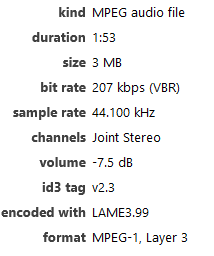
The current encoder is 3.100. 3.100 is much better than 3.99. The only way I can get a better version of the file is to source the CD or an FLAC rip and re-do the conversion to MP3. Which means that there is still utility in keeping the big file! There is no way to reap the improvements of better codecs without ripping again. So this MP3, as well as countless others in my collection, are probably stuck like this for the foreseeable future. Some things were never shared in lossless, especially rare demos and live distributed items.
Now here are a few even more sketch files:
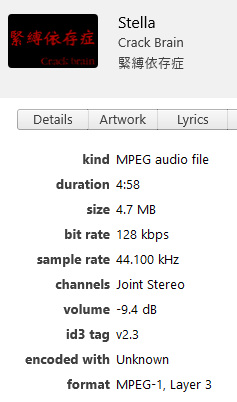
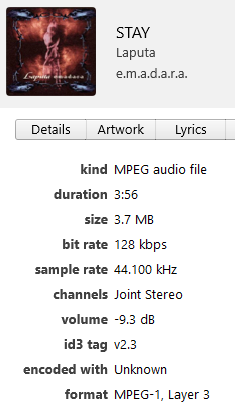
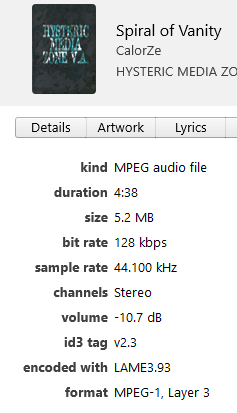
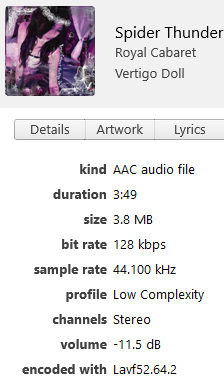
You can literally date some of these rips by the version of LAME used (or in the case of Unknown, something so old that it didn’t embed its own tags in the file). And no, none of these sound great. Passable, yes. Great? No.
This is why I keep the big file and re-do the conversion on the fly to my device which I take everywhere with me.
Now I’m not necessarily saying “fuck MP3, rip everything in Opus”! I’m giving out options. I know there are people on our forum with data caps that just can’t pull down lossless copies of everything. I know there are plenty of people who store music on a device with limited space. For those people in particular, I think Opus would be a wonderful alternative. Just look at the size difference for MACABRE!
And if you really can’t hear the difference, then take the space savings as a win!
